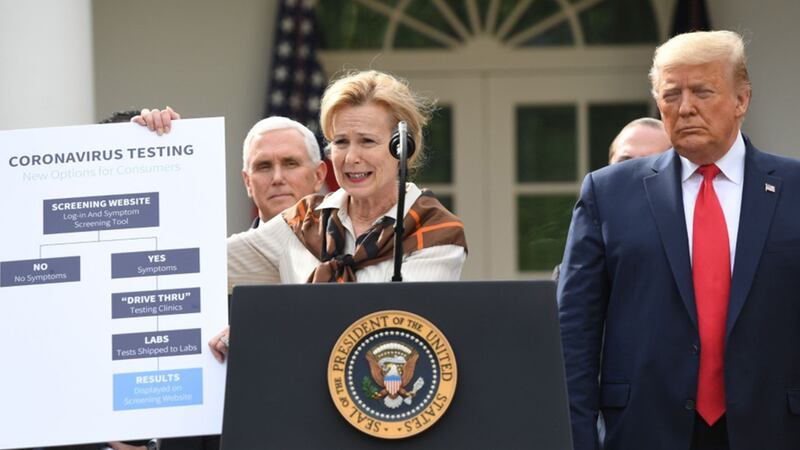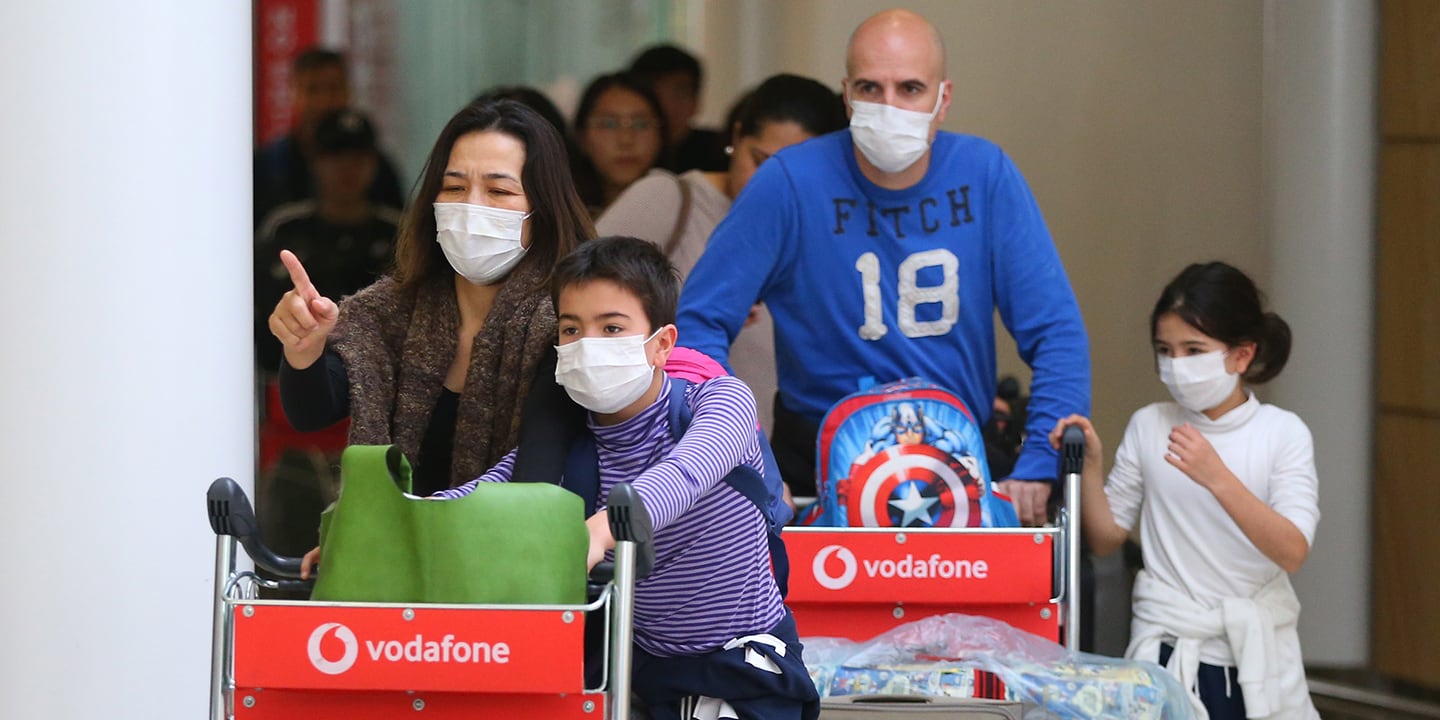Last week, the head of a Chinese government expert team said that human-to-human transmission has been confirmed in the Wuhan coronavirus outbreak. On Monday, the Centers for Disease Control and Prevention recommended that people avoid travel to China.
Here are some tips for travelers who may be making their way to or from China or other destinations:
Check the CDC website for updates on the outbreak
The CDC has a dedicated page that is kept up to date with travel information to China, impacted transportation in China and status of medical care in the country.
Maintain good personal hygiene
According to The New York Times, passengers should avoid touching their faces and practice proper coughing etiquette, such as coughing or sneezing into an arm instead of your hands or the environment.
The CDC recommends washing hands for at least 20 seconds. An alcohol-based hand sanitizer with at least 60% alcohol can be used when soap is not available.
The Times also reminded travelers that seatbacks and tray tables are wiped down by ground crews, but cleaning them again with a disinfecting wipe is recommended.
Lastly, try to keep a safe distance from anyone who appears to be ill. If you are seated next to someone who may be ill, you can ask a flight attendant to reseat you. Please note that they may not be able to accommodate the request.
Do I need a mask while traveling?
Dr. William Schaffner, a professor of medicine in Vanderbilt University’s division of infectious diseases, told CNN that the benefit of masks may be impractical.
“The scientific basis showing that people in the community wearing masks actually has any benefit is very thin and questionable,” Shaffner told CNN.
Schaffner also told CNN that U.S. travelers who are traveling only within the United States should not be as concerned about the virus.
Other noteworthy tips
Henry Harteveldt, of Atmosphere Research, told USA Today that travelers should consider keeping air vents open above the seat to improve ventilation but also noted that he aims them away from his body.
USA Today also suggested bringing tissues with you to use to avoid touching door handles when you use the bathrooms on flights.
Book a window seat. A study published in 2018 concluded that the window seat is more likely to keep a passenger away from people who might be sick because it is furthest from the aisle where more people move through the cabin.
What are other countries doing in response to the outbreak?
Many countries are checking the temperatures of arriving airline passengers and adopting precautionary quarantine procedures in response to a new virus. India, Nigeria, Japan and the United States are some of the countries where airport screening procedures were in place.
Below are some of the public health measures in multiple countries intended to prevent a repeat of the 2002-2003 outbreak of SARS, which started in China and killed nearly 800 people (Source:The Associated Press, Jan. 21, 2020)
MAINLAND CHINA
China’s often-secretive Communist government was blamed for making SARS far worse by initially hiding information and blocking the work of the World Health Organization. This time, leader Xi Jinping has called for tough measures and said “party committees, governments and relevant departments at all levels should put people’s lives and health first.” At the airport in Wuhan, the temperatures of departing passengers were checked and outbound tour groups were banned from leaving the city. Virtually everyone in a public role, from traffic police officers to bank tellers, is wearing a protective face mask.
JAPAN
Japanese Prime Minister Shinzo Abe urged officials to step up quarantine checks at airports and other entry points, and Japan will require visitors arriving from Wuhan to fill in health forms.
HONG KONG
The semiautonomous city is one of the most popular destinations for mainland Chinese. It has stepped up surveillance and ordered more cleaning and disinfecting for planes and trains from Wuhan, as well as for train stations and the airport. Acting Chief Executive Matthew Cheung said authorities are ready for a worst-case scenario and are on extremely high alert. A lack of information and low levels of vigilance were blamed for Hong Kong becoming the second-hardest hit area by SARS after mainland China in the early 2000s. As in much of mainland China, Hong Kong residents favor traditional markets where live poultry and other animals are sold. The government advises people against visiting such markets or touching animals or their droppings.
SOUTH KOREA
South Korea reported its first case of the virus in mid-January, in a Chinese woman who works at a South Korean company. At Incheon International Airport near Seoul, the only airport in South Korea with direct flights from Wuhan, two special gates are designated for passengers from the city and ear thermometers are used to check their temperatures. Arrival halls are being sprayed with disinfectant twice a week, up from once a week previously, and escalator handrails, elevator buttons and other sensitive surfaces are wiped with disinfectant twice a day.
NIGERIA
Nigeria’s government says health authorities at points of entry are on alert for cases of coronavirus arriving in Africa’s most populous country. The Nigeria Center for Disease Control asked that travelers from Wuhan report to a medical facility and the center if they feel ill. China is Africa’s top trading partner. South Africa’s National Institute for Communicable Diseases said anyone with a severe respiratory illness should be tested if they have traveled to Wuhan within two weeks or had close physical contact with a coronavirus patient or treatment at a facility where a confirmed case has been reported. There were more than 200,000 Chinese workers in Africa as of the end of 2017, not including numerous informal migrants such as traders and shopkeepers, according to the China Africa Research Initiative at Johns Hopkins University.
INDIA
India will expand thermal screening of passengers arriving from China, including Hong Kong, to seven airports from the current three. In-flight announcements before arrival will direct passengers with a fever or cough who have traveled to Wuhan in the previous 14 days to declare themselves to health authorities. Thermal screening will begin in Chennai, Bengaluru, Hyderabad and Cochin, and continue in Delhi, Mumbai and Kolkata, the Ministry of Civil Aviation said.
SINGAPORE AND MALAYSIA
Singapore will expand temperature screening at Changi Airport, one of Asia’s busiest travel hubs, for all travelers on flights arriving from China beginning on Wednesday. The health ministry said individuals with pneumonia and a history of travel to Wuhan within 14 days of the onset of symptoms will be isolated in a hospital as a precautionary measure and investigated. Neighboring Malaysia has also beefed up screening at Kuala Lumpur’s airport. Deputy health Minister Lee Boon Chye said staff are being trained to handle possible cases. “If a case emerges, then we may have to take more drastic measures, but for now, we hope we can nip it at the entry point,” Lee told reporters.
BANGLADESH
Bangladesh civil aviation authorities have ordered airport managers to start screening incoming passengers from China. A.H.M. Touhid-ul Ahsan, director of the main Shahjalal International Airport, said doctors at the airport would look for fevers, coughs, breathing difficulties and sore throats. The country’s Institute of Epidemiology, Disease Control and Research will be notified of any passengers with symptoms for further examination, he said.
AUSTRALIA
Brendan Murphy, Australia’s chief medical officer, said biosecurity staff and state health officials in New South Wales are meeting flights from Wuhan and are distributing pamphlets printed in English and Chinese to all passengers. The pamphlets describe symptoms of infection and ask people to identify themselves if they are experiencing any.
RUSSIA
Russia’s Healthcare Ministry described the virus as a biological hazard, with Deputy Minister Sergei Krayevoy saying the virus was a “striking example” of the biological threats Russia faces. The Russian public health service, Rospotrebnadzor, said it had developed a testing kit that would allow labs to detect the new coronavirus quickly. Russia is one of the three most popular tourist destinations for people from China, according to Russian officials. They estimate that about 2 million tourists from China visited Russia in 2018.
ITALY
The Italian Health Ministry says passengers making direct and indirect flights from Wuhan, China, to Rome’s Leonardo da Vinci airport will be checked for potential signs of the virus. People with suspected infections will be quarantined at an infectious disease hospital in Rome, the ministry says. No cases have been reported so far. Posters at the airport advise travelers to consider delaying trips to the Wuhan area and if they do go there, to avoid touching animals or uncooked animal products.
The Associated Press contributed to this story. Associated Press journalists Moussa Moussa in Canberra, Australia, Kim Hyung-jin in Seoul, South Korea, Cara Anna in Johannesburg, South Africa, Eileen Ng in Kuala Lumpur, Malaysia, Daria Litvinova in Moscow, and Mari Yamaguchi in Tokyo contributed to this report.
© 2020 Cox Media Group









